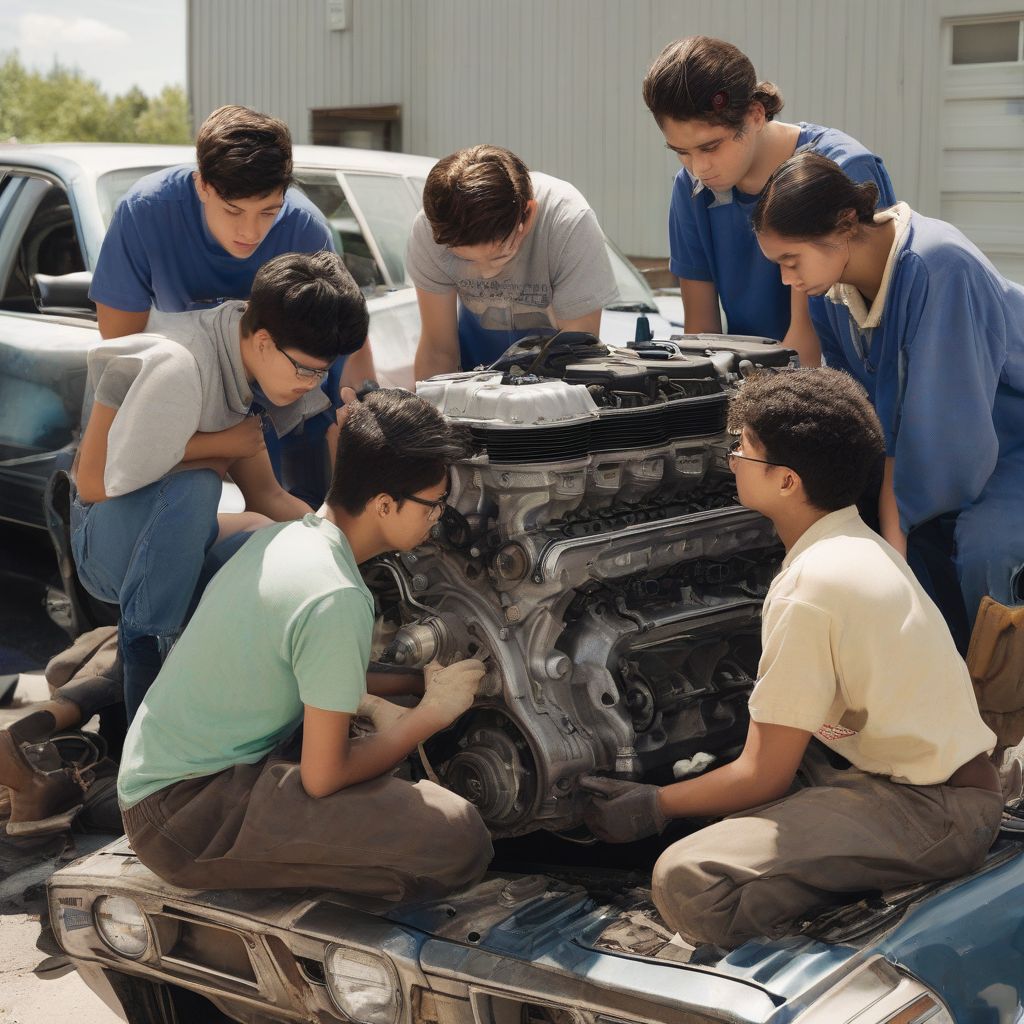Have you ever dreamt of diagnosing car troubles like a pro or rebuilding an engine with your own two hands? The roar of an engine, the intricacies of a transmission, the satisfaction of a job well done – if these things ignite a spark in you, then a career as an automotive mechanic might be your perfect drive. And the journey begins with finding the right Automotive Mechanic Classes.
Gearing Up for Success: Why Automotive Mechanic Classes Matter
Automotive mechanic classes provide the foundation for a successful career in the ever-evolving world of vehicle repair. These classes equip aspiring mechanics with the technical skills and knowledge necessary to diagnose, repair, and maintain vehicles of all shapes and sizes.
What Will You Learn in Automotive Mechanic Classes?
Automotive mechanic classes cover a wide range of topics, including:
- Engine Repair: Dive into the heart of a vehicle and learn about engine components, diagnostics, repair procedures, and emerging technologies like hybrid and electric vehicles.
- Brake Systems: Master the critical aspects of brake systems, including hydraulics, ABS, electronic stability control, and advanced driver-assistance systems.
- Transmission Systems: Explore the complexities of manual, automatic, and CVT transmissions, learning about repair, maintenance, and troubleshooting techniques.
- Electrical Systems: Navigate the intricate world of automotive electrical systems, from basic wiring to complex computer-controlled modules.
- Heating and Air Conditioning: Understand the principles of automotive climate control systems, including refrigerant handling, component diagnosis, and repair procedures.
Choosing the Right Automotive Mechanic School
Finding the right automotive mechanic school is crucial for your success. Consider these factors:
- Accreditation: Look for schools accredited by reputable organizations like the National Automotive Technicians Education Foundation (NATEF) to ensure a high-quality education.
- Curriculum: Examine the curriculum to see if it aligns with your career goals and includes training on the latest automotive technologies.
- Faculty: Research the experience and qualifications of the instructors to ensure you’ll be learning from industry professionals.
- Facilities: Visit the school and check out their facilities, including workshops, labs, and equipment, to ensure they provide a hands-on learning environment.
- Job Placement Assistance: Inquire about career services and job placement assistance to help you transition into the workforce after graduation.
ielts24h.com/wp-content/uploads/2024/08/mechanic-students-working-on-car-engine-66bc80.jpg" alt="Students Working on Car Engine" width="1024" height="1024">Students Working on Car Engine
FAQs: Answering Your Burning Questions about Automotive Mechanic Classes
1. How long does it take to complete automotive mechanic classes?
The duration of automotive mechanic programs can vary depending on the type of program and the level of certification you’re pursuing. Certificate programs may take a few months to a year, while associate degree programs typically take two years to complete.
2. What are the job prospects for automotive mechanics?
The job outlook for automotive mechanics is positive, with steady growth projected in the coming years. As vehicles become more technologically advanced, skilled mechanics will be in high demand.
3. What certifications are available for automotive mechanics?
The National Institute for Automotive Service Excellence (ASE) offers various certifications for different automotive specialties, enhancing your credibility and earning potential.
Revving Up Your Future: The Benefits of a Career as an Automotive Mechanic
Choosing a career as an automotive mechanic offers numerous rewards:
- Job Security: Skilled mechanics are always in demand, providing job stability in a constantly evolving field.
- Good Earning Potential: Experienced automotive mechanics can earn competitive salaries, especially those with specialized certifications.
- Hands-On Work: If you enjoy working with your hands and solving problems, a career as a mechanic provides a challenging and engaging work environment.
- Constant Learning: The automotive industry is constantly evolving, offering opportunities for lifelong learning and professional development.
- Personal Satisfaction: Knowing you’re keeping vehicles safe and reliable on the road can bring a sense of pride and accomplishment.
Conclusion: Start Your Engines and Begin Your Automotive Mechanic Journey
Embarking on a career as an automotive mechanic starts with finding the right training program. By enrolling in comprehensive automotive mechanic classes, you’ll gain the knowledge, skills, and hands-on experience needed to succeed in this rewarding and in-demand profession. So why wait? Start your engines and steer your career toward an exciting future in the world of automotive repair!
